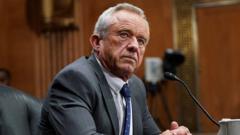Kennedy's confirmation journey highlights deep political divisions as he faces scrutiny over health views, paving the way for a full Senate vote amidst challenges.
RFK Jr's Senate Nomination Advances Amid Controversy

RFK Jr's Senate Nomination Advances Amid Controversy
Robert F. Kennedy Jr. moves closer to potential health secretary role after Senate committee approval, sparking debate over vaccine skepticism.
In a significant development for Robert F. Kennedy Jr., the Senate Finance Committee has advanced his nomination for US health secretary with a narrow 14-13 vote, aligning primarily along party lines. The committee's decision marks a crucial step as Kennedy prepares for a full Senate vote, where Republicans hold a 53-47 majority.
Kennedy, whose vaccine skepticism has drawn considerable attention, noted in his testimony that he does not oppose vaccines but advocates for enhanced safety evaluations. Senators challenged him on past provocative statements, including a controversial assertion that no vaccine is entirely safe or effective. While facing critiques, including visuals of anti-vaccine merchandise linked to a group he previously led, Kennedy distanced himself by emphasizing a lack of current oversight over the organization.
Despite the skepticism from many Democratic Senators, he secured vital support from Republican Senator Bill Cassidy, who indicated confidence in Kennedy's commitment to reform. Kennedy's experiences as both an environmental attorney and a controversial figure in health advocacy culminated in his nomination, succeeding after a latest change from Democratic ambitions to an independent campaign, before backing Donald Trump.
As potential health secretary, Kennedy’s responsibilities would encompass vital agencies like the FDA, CDC, NIH, and CMS. He indicated a focus on reforming food safety regulations rather than limiting vaccinations or fast-food options, which he feels are less regulated in the US compared to Europe. The upcoming full Senate vote will determine his final confirmation amidst an intensely polarized political landscape.
Kennedy, whose vaccine skepticism has drawn considerable attention, noted in his testimony that he does not oppose vaccines but advocates for enhanced safety evaluations. Senators challenged him on past provocative statements, including a controversial assertion that no vaccine is entirely safe or effective. While facing critiques, including visuals of anti-vaccine merchandise linked to a group he previously led, Kennedy distanced himself by emphasizing a lack of current oversight over the organization.
Despite the skepticism from many Democratic Senators, he secured vital support from Republican Senator Bill Cassidy, who indicated confidence in Kennedy's commitment to reform. Kennedy's experiences as both an environmental attorney and a controversial figure in health advocacy culminated in his nomination, succeeding after a latest change from Democratic ambitions to an independent campaign, before backing Donald Trump.
As potential health secretary, Kennedy’s responsibilities would encompass vital agencies like the FDA, CDC, NIH, and CMS. He indicated a focus on reforming food safety regulations rather than limiting vaccinations or fast-food options, which he feels are less regulated in the US compared to Europe. The upcoming full Senate vote will determine his final confirmation amidst an intensely polarized political landscape.






















